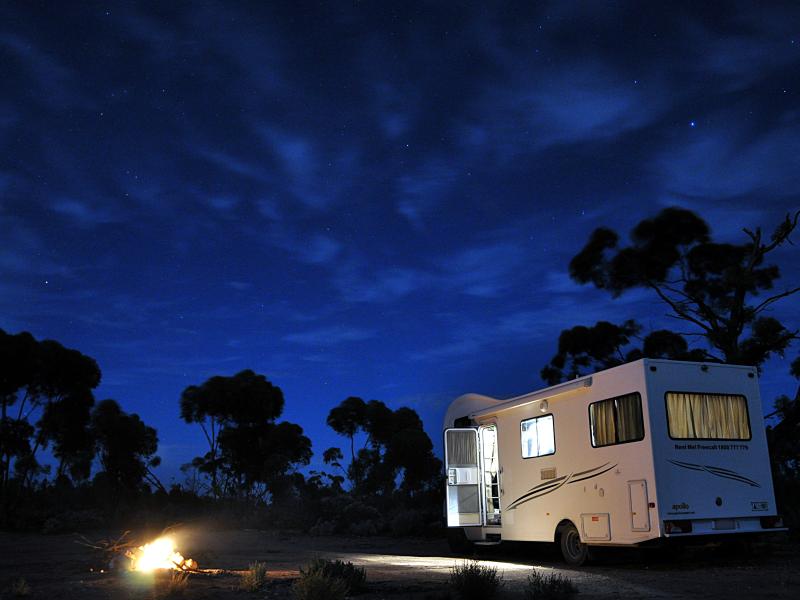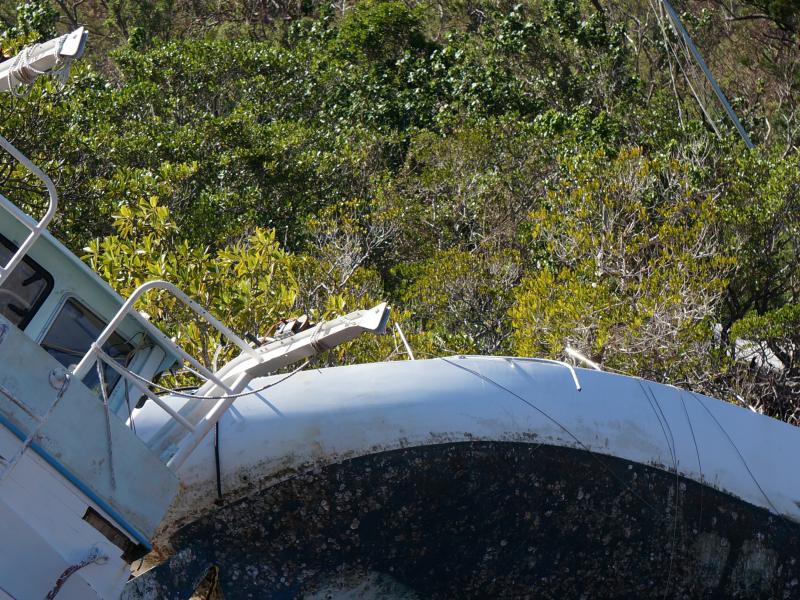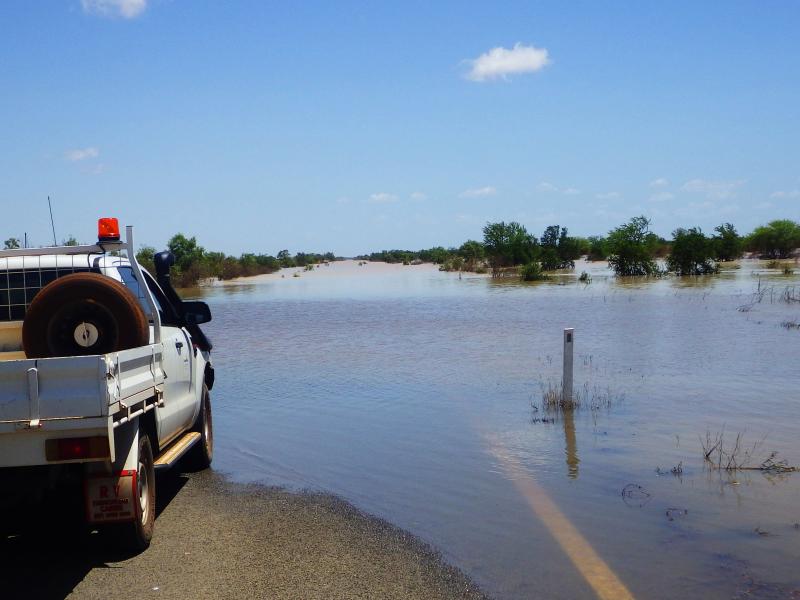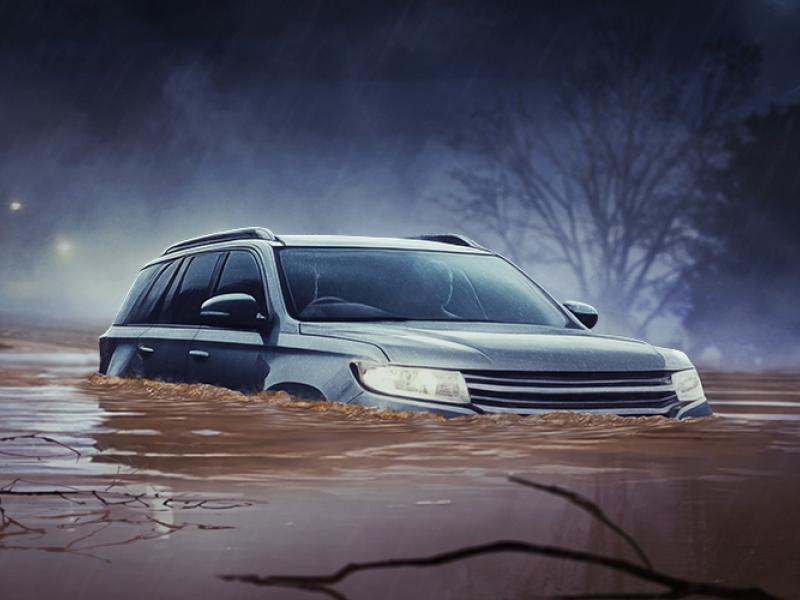Whether you are visiting a foreign country or exploring parts of your own country, you are likely to encounter unfamiliar places and conditions that you need to prepare for.
Understand your destination
Savvy travellers will do some research into the place they are visiting and plan as best as possible for the unexpected. It’s really important to listen carefully to local warnings and advice to stay safe as the conditions of the environments you are visiting may be very different to those you are familiar with at home.
Prepare for a road trip
There is no better way to see all that Queensland has to offer than by packing up your car, campervan or caravan and going on the ultimate road trip. Before you hit the road, Get Ready with some planning and preparation to make sure you stay safe on your adventures in the event you are caught up in a natural disaster.
Hover over the interactive dots below or expand the checklist to find out how to best prepare.
Alternatively, the following checklist is also available in the Get Ready Queensland Protection while you are out and about booklet (PDF, 1.21MB) which is available to download.
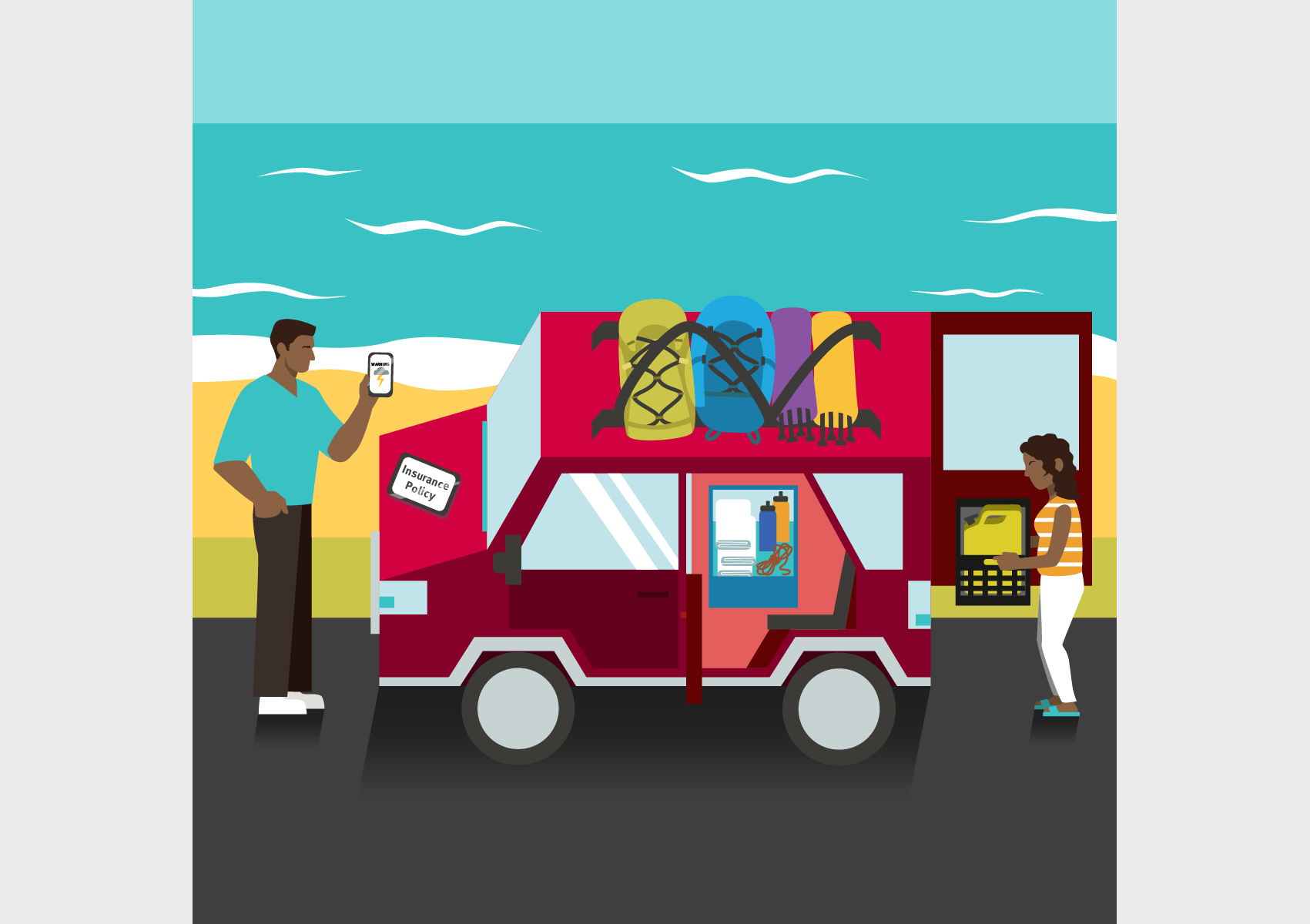
Ensure your car insurance (or the rental companies’ insurance) is current and that it covers your vehicle adequately.

Check you have good tyre tread (at least 1.5mm deep across the whole tyre width).

Check all of your vehicle’s lights work well.

Make sure windscreen and lights are clean.

Have a spare supply of fuel for use in your vehicle to get you to the nearest fuel outlet (ensure you store fuel safely in an appropriate container).

Ensure your travel insurance is adequate to cover your belongings which may be damaged in the car during a natural disaster.

Download useful apps and sign-up to local weather alerts and warnings for the areas you are visiting.
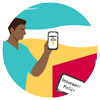
Store additional blankets or a hail cover in your car. If you cannot access undercover shelter for your vehicles during a severe storm or cyclone, firmly secure blankets or quilts to them to minimise hail damage.

Ensure your car insurance (or the rental companies’ insurance) is current and that it covers your vehicle adequately.

Check you have good tyre tread (at least 1.5mm deep across the whole tyre width).

Check all of your vehicle’s lights work well.

Make sure windscreen and lights are clean.

Have a spare supply of fuel for use in your vehicle to get you to the nearest fuel outlet (ensure you store fuel safely in an appropriate container).

Ensure your travel insurance is adequate to cover your belongings which may be damaged in the car during a natural disaster.

Download useful apps and sign-up to local weather alerts and warnings for the areas you are visiting.

Store additional blankets or a hail cover in your car. If you cannot access undercover shelter for your vehicles during a severe storm or cyclone, firmly secure blankets or quilts to them to minimise hail damage.

Ensure your car insurance (or the rental companies’ insurance) is current and that it covers your vehicle adequately.

Check you have good tyre tread (at least 1.5mm deep across the whole tyre width).

Check all of your vehicle’s lights work well.

Make sure windscreen and lights are clean.

Have a spare supply of fuel for use in your vehicle to get you to the nearest fuel outlet (ensure you store fuel safely in an appropriate container).

Ensure your travel insurance is adequate to cover your belongings which may be damaged in the car during a natural disaster.

Download useful apps and sign-up to local weather alerts and warnings for the areas you are visiting.

Store additional blankets or a hail cover in your car. If you cannot access undercover shelter for your vehicles during a severe storm or cyclone, firmly secure blankets or quilts to them to minimise hail damage.

Road trip emergency kit
Whether it be a seaside destination, an urban exploration or an outback adventure, make sure you pack your road trip emergency kit to ensure you are prepared for all matter of situations.
Hover over the interactive dots below or expand the checklist to find out what you should include.
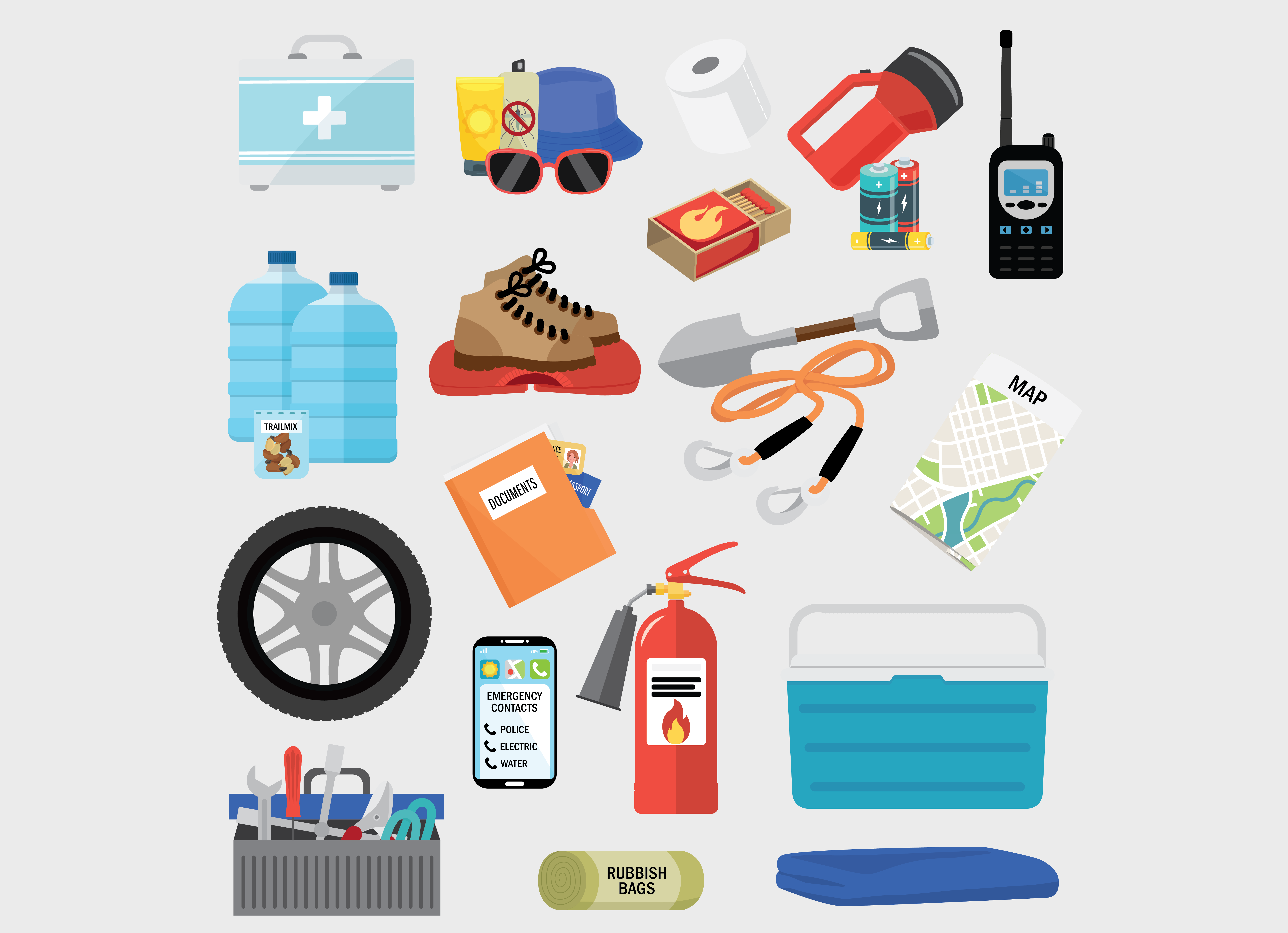
Ensure you have a first aid kit and manual in case of any medical incident on the road.

Queensland’s summers can be extremely hot and humid bringing with it the risk of sunburns and insect bites. Make sure you pack plenty of bug and mozzie repellent, at least 30+ sunscreen, glasses and a hat.

Its always good to have a roll of toilet paper on hand.

A heavy duty, waterproof torch (and spare batteries) will provide valuable light when you most need it. Avoid using your smartphone as a light source to preserve battery during an emergency.

Matches are extremely useful in the event you get stranded and need to start a campfire to keep warm.

Look into alternative communication equipment such as a 2-way radio to have as a backup in an emergency as your mobile phone may not work in remote areas.
Keep bottled water and dry food/snacks in your car in case you are caught away from your accommodation (20 litres emergency use and 4 litres per person per day).
Take appropriate layers and types of clothing and footwear according to the environment you are visiting.

Pack a shovel and a towrope in case you get bogged. However always abide by ‘if it’s flooded, forget it’ if you come across any flooded road on your travels.
Pack hard copy maps of the places you are visiting in case you lose mobile connection.

Know where the jack in the car is stored and have 1-2 spare tyres packed in case you get a puncture.

Keep a photo copy of your driver’s licence, passport, travel and insurance papers as back-up.

Save local emergency contact details in your phone in case you need to call for help. Go to the Get Ready Emergency Contacts page for a full listing. Download helpful apps and sign up to local weather warnings and road condition updates to stay informed especially using storm and cyclone season. Check out the Get Ready alerts and warnings pages for some ideas.

A small fire extinguisher specifically for car use can help prevent a small fire from becoming unmanageable.

An esky is great to have to keep your water and any other other snacks cool during Queensland’s hot summer.

Pack a tool kit in case you need to do any mechanical repairs whilst on the road – you don’t need to be a mechanic but it’s good to know a few basic skills.

Rubbish bags are handy on your travels to contain any rubbish but are also handy to waterproof any belongings in the event your vehicle exterior is exposed to rain and exposes your belongings.
Blankets are useful for keeping warm if you are stranded in your vehicle or can be used to protect your car if caught in a hail storm. A tarpaulin is also useful to keep the weather out of your car in case of a shattered windscreen or window.
Ensure you have a first aid kit and manual in case of any medical incident on the road.

Queensland’s summers can be extremely hot and humid bringing with it the risk of sunburns and insect bites. Make sure you pack plenty of bug and mozzie repellent, at least 30+ sunscreen, glasses and a hat.

Its always good to have a roll of toilet paper on hand.

A heavy duty, waterproof torch (and spare batteries) will provide valuable light when you most need it. Avoid using your smartphone as a light source to preserve battery during an emergency.

Matches are extremely useful in the event you get stranded and need to start a campfire to keep warm.

Look into alternative communication equipment such as a 2-way radio to have as a backup in an emergency as your mobile phone may not work in remote areas.
Keep bottled water and dry food/snacks in your car in case you are caught away from your accommodation (20 litres emergency use and 4 litres per person per day).
Take appropriate layers and types of clothing and footwear according to the environment you are visiting.

Pack a shovel and a towrope in case you get bogged. However always abide by ‘if it’s flooded, forget it’ if you come across any flooded road on your travels.
Pack hard copy maps of the places you are visiting in case you lose mobile connection.

Know where the jack in the car is stored and have 1-2 spare tyres packed in case you get a puncture.

Keep a photo copy of your driver’s licence, passport, travel and insurance papers as back-up.

Save local emergency contact details in your phone in case you need to call for help. Go to the Get Ready Emergency Contacts page for a full listing. Download helpful apps and sign up to local weather warnings and road condition updates to stay informed especially using storm and cyclone season. Check out the Get Ready alerts and warnings pages for some ideas.

A small fire extinguisher specifically for car use can help prevent a small fire from becoming unmanageable.

An esky is great to have to keep your water and any other other snacks cool during Queensland’s hot summer.

Pack a tool kit in case you need to do any mechanical repairs whilst on the road – you don’t need to be a mechanic but it’s good to know a few basic skills.

Rubbish bags are handy on your travels to contain any rubbish but are also handy to waterproof any belongings in the event your vehicle exterior is exposed to rain and exposes your belongings.
Blankets are useful for keeping warm if you are stranded in your vehicle or can be used to protect your car if caught in a hail storm. A tarpaulin is also useful to keep the weather out of your car in case of a shattered windscreen or window.
Ensure you have a first aid kit and manual in case of any medical incident on the road.

Queensland’s summers can be extremely hot and humid bringing with it the risk of sunburns and insect bites. Make sure you pack plenty of bug and mozzie repellent, at least 30+ sunscreen, glasses and a hat.

Its always good to have a roll of toilet paper on hand.

A heavy duty, waterproof torch (and spare batteries) will provide valuable light when you most need it. Avoid using your smartphone as a light source to preserve battery during an emergency.

Matches are extremely useful in the event you get stranded and need to start a campfire to keep warm.

Look into alternative communication equipment such as a 2-way radio to have as a backup in an emergency as your mobile phone may not work in remote areas.
Keep bottled water and dry food/snacks in your car in case you are caught away from your accommodation (20 litres emergency use and 4 litres per person per day).
Take appropriate layers and types of clothing and footwear according to the environment you are visiting.

Pack a shovel and a towrope in case you get bogged. However always abide by ‘if it’s flooded, forget it’ if you come across any flooded road on your travels.
Pack hard copy maps of the places you are visiting in case you lose mobile connection.

Know where the jack in the car is stored and have 1-2 spare tyres packed in case you get a puncture.

Keep a photo copy of your driver’s licence, passport, travel and insurance papers as back-up.

Save local emergency contact details in your phone in case you need to call for help. Go to the Get Ready Emergency Contacts page for a full listing. Download helpful apps and sign up to local weather warnings and road condition updates to stay informed especially using storm and cyclone season. Check out the Get Ready alerts and warnings pages for some ideas.

A small fire extinguisher specifically for car use can help prevent a small fire from becoming unmanageable.

An esky is great to have to keep your water and any other other snacks cool during Queensland’s hot summer.

Pack a tool kit in case you need to do any mechanical repairs whilst on the road – you don’t need to be a mechanic but it’s good to know a few basic skills.

Rubbish bags are handy on your travels to contain any rubbish but are also handy to waterproof any belongings in the event your vehicle exterior is exposed to rain and exposes your belongings.
Blankets are useful for keeping warm if you are stranded in your vehicle or can be used to protect your car if caught in a hail storm. A tarpaulin is also useful to keep the weather out of your car in case of a shattered windscreen or window.
Protect your caravan when a severe weather warning is issued
If you get caught in a major weather event whilst holidaying in your caravan, preparations should be immediately undertaken when a severe weather warning for a storm or cyclone is issued. For a full checklist of how best to protect your home away from home, check out the Get Ready caravans page.
Find out more and Get Ready
Check out these other pages and resources to help you Get Ready.
